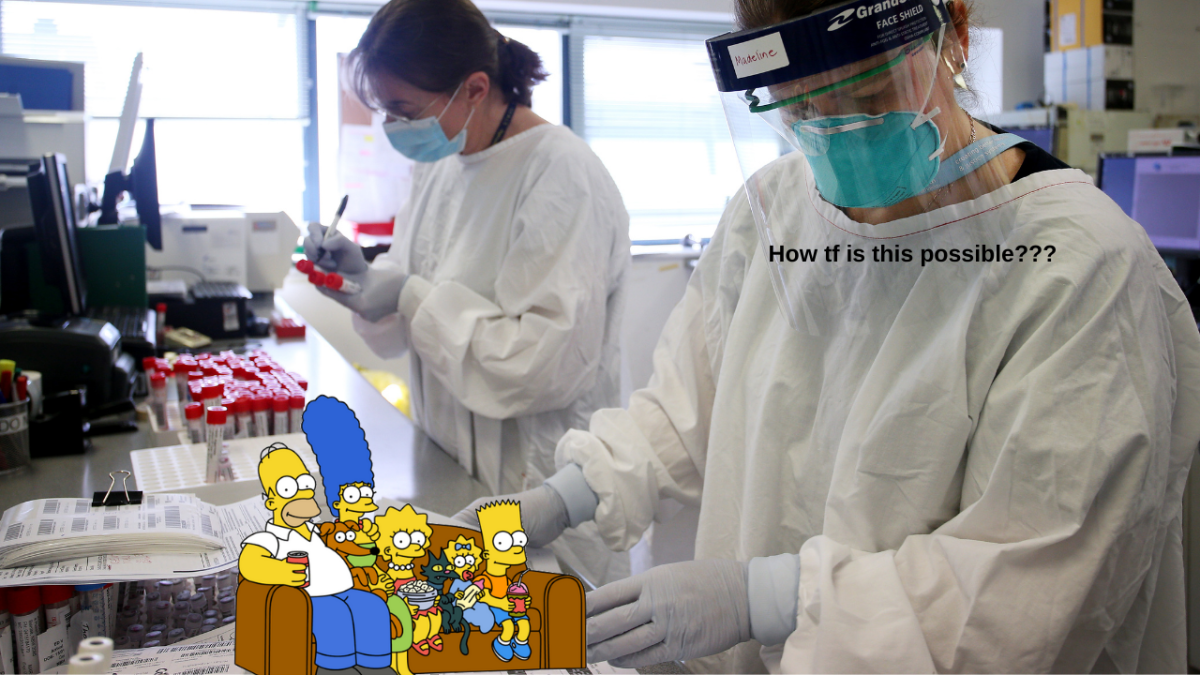
While it seems almost impossible considering the transmissibility of the Omicron COVID strain, some Aussies managed to defeat the odds and dodge the virus over summer, even when people in their own homes weren’t so lucky. How the bloody heck is this possible? Are some folks just pure genetic freaks incapable of catching Ms Rona? Let’s investigate.
If you’re anything like me, you’re probably still trying to mentally piece together what exactly occurred over the Christmas-to-January period with regards to COVID. There was the stress of trying to find a RAT while attempting to keep your friends and fam safe, combined with the anxiety of not knowing when/if it was going to end. The whole sitch caused a lot of headaches for a lot of people.
One such headache was figuring out the following mysterious occurrence: someone in your house got COVID and you didn’t, even after you literally cooked spaghetti bolognese together a few nights before.
Of course, you would’ve had to isolate regardless as a close contact but you didn’t have to deal with all the fun symptoms of the spicy cough. How tf is this possible???
Well, scientists have a few hypotheses.
Michael Good AO is from Griffith University told the ABC earlier in the year that as a general rule, “eighty per cent of transmission is in general caused by 20 per cent of those who are infected”.
That most infectious 20% could be in that category for a variety of reasons according to the Griffith Uni professor. “I wouldn’t underestimate the possibility of biological differences. There’s still research ongoing to address that,” said Good.
Holy crap, does this mean that some folks are just biologically more immune ie: genetic tanks, ie: fkn units, ie: superheroes? Well, as the professor said, it’s all still a hypothesis at this point so don’t go out coughing on people anytime soon.
There are a lot of other factors at play such as how loudly you speak (louder means more spicy cough particles entering the air) and whether you’re prone to singing loudly (lookin’ at you, musical theatre kids). These sorts of behaviours can affect whether your housemates spread COVID to one another.
Associate Professor Paul Griffin, the director of infectious diseases at Brisbane’s Mater Health Services hypothesised that a person’s “viral load” (the amount of virus in an infected person’s blood or other bodily fluids such as saliva) had a lot to do with infectiousness.
“It can depend on their viral load and their symptoms. If they’re not coughing and sneezing much there’ll be less risk,” as per The Age.
Griffin also stated that vaccination had a lot to do with it, with those up to date with the booster shots being less infectious and less likely to have contracted COVID.
He went on to say that in addition, to viral load and vaccination variation, “there are environmental factors like how well ventilated the home is and whether the infected person is isolating or in contact with the others”.
Associate Professor Nathan Bartlett from the University of Newcastle added that previously having a common cold could have affected your immunity.
“There are four endemic common cold coronaviruses circulating globally and they have similarities in their proteins to the coronavirus that causes COVID,” Bartlett told The Age.
“It’s these proteins that your immune system recognises and might provide some level of cross protection.”
Again, Bartlett was eager to stress that this was also just a hypothesis at this stage and “not proof”.
Lastly, Professor Bartlett flagged a few more ideas for why transmissibility and immunity vary from one housemate to another. “Age, gender, nutrition, body weight, stress and chronic disease, and they can help tip the balance either way”.
So there you have it. Those were the best hypotheses as to why some peeps in your share-house got COVID and you didn’t, ya bloody lucky human.
Now go forth and book your booster shot before someone else in your house cops COVID.







